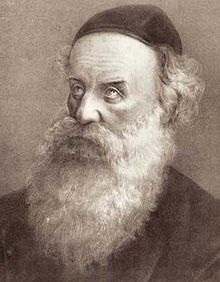
(Sorry, there is no quiz here, just a little Torah. I hope you're not disappointed.)
Shneur Zalman also was the author of the Tanya, the great chasidic philosophical work that describes the Chabad approach of applying rigorous intellectual scrutiny to Jewish mysticism. His aim was to create a system that would appeal to and stimulate the intellect as a way of gaining deeper spiritual connection to God.
An example of Shneur Zalman's approach can be seen in this week's Torah portion, Vayikra. The first portion of the book of Leviticus focusses on the offerings of animal and grain sacrifices that were brought to the Temple in Jerusalem in ancient times. In typical chasidic fashion, Schneur Zalman had no interest in the actual mechanics of sacrificing animals. He saw the sacrifices as symbolic of our inner spiritual life.
He commentary notes an odd construction of a verse at the beginning of this week's portion:
“Speak to the Israelites and say to them: ‘When a person offers from you a sacrifice to Adonai of livestock, cattle or flocks, you shall offer your offering'" (Leviticus 1:2)
Schneur Zalman explained that the unexpected word order conveys meaning. The sacrificial offering, he wrote, truly is from you. That is, it is composed of an aspect of your being.
When you want to draw yourself closer to God, you have to offer something "from you," that is, from your very self. You are to bring the animal that is in you, your "evil inclination" (yetzer hara), which is called the “animal soul.”
Notice that the commentary does not call upon you to reject or to deny your "animal soul." That would be an impossibility and an exercise in self-loathing. Rather, he asks that you offer that part of yourself up to God. Identify it, know it, accept it, and tame it so that it will be transformed from a personal stumbling block into a symbol of a new relationship with God — one in which you know yourself more deeply and, thereby, come to know God more deeply.
This is not easy work. The teaching calls on you to be a spiritual warrior and to fight a long battle to know your own nature. It wants you, through the abilities of your mind, to improve and elevate yourself to a higher plane of being.
In a way, it is ironic that Chabad today often is identified with a hyper-observant Judaism that seems to ask people to turn their minds off rather than to engage their intellect to gain greater connection to God. Schneur Zalman asked his students two hundred years ago to do something quite different. He wanted them to cling to God through deep, skeptical inquiry.
We grow closer to God when we use our intellect to probe who we are and what our life's meaning is. God has given us minds to understand ourselves and our world more deeply — including our evolving approach to gender inclusion, understanding of history and science, and our tolerance and respect for people of different cultures and traditions. By facing the challenge, we elevate our animal nature into something that allows us to reach toward our highest selves.
Other Posts on This Topic:
Terumah: What to Give the God Who Has Everything
The Problem with Certainty

 RSS Feed
RSS Feed
